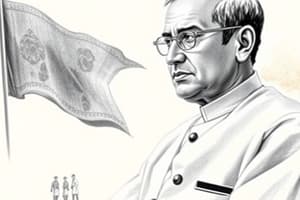Podcast
Questions and Answers
What was the immediate challenge faced by India after attaining independence?
What was the immediate challenge faced by India after attaining independence?
- Resettling refugees
- Ensuring development and well-being of society
- Shaping a united but diverse nation (correct)
- Establishing democracy
Which aspect of the Indian Constitution granted fundamental rights and the right to vote to every citizen?
Which aspect of the Indian Constitution granted fundamental rights and the right to vote to every citizen?
- Preamble (correct)
- Fundamental Duties
- Directive Principles of State Policy
- Amendment Procedures
What type of democracy did India adopt post-independence?
What type of democracy did India adopt post-independence?
- Direct democracy
- Constitutional monarchy
- Representative democracy (correct)
- Presidential democracy
How did the Indian Constitution address the principle of equality?
How did the Indian Constitution address the principle of equality?
Which challenge included granting special protection to religious and cultural communities?
Which challenge included granting special protection to religious and cultural communities?
What was the legacy of partition that posed a challenge to India?
What was the legacy of partition that posed a challenge to India?
What was the 'two-nation theory' advanced by the Muslim League?
What was the 'two-nation theory' advanced by the Muslim League?
Who was Khan Abdul Gaffar Khan and what was his stance during the partition?
Who was Khan Abdul Gaffar Khan and what was his stance during the partition?
What challenges arose due to the geographical distribution of Muslim-majority areas in British India?
What challenges arose due to the geographical distribution of Muslim-majority areas in British India?
How were Punjab and Bengal handled during the partition due to large non-Muslim populations?
How were Punjab and Bengal handled during the partition due to large non-Muslim populations?
What was the main problem faced by minorities during the partition?
What was the main problem faced by minorities during the partition?
What caused deep trauma during the partition, especially in Punjab and Bengal?
What caused deep trauma during the partition, especially in Punjab and Bengal?
Flashcards are hidden until you start studying
Study Notes
Challenges after Independence
- Immediate challenge faced by India after attaining independence was integration of 565 princely states, territorial consolidation, and dealing with the aftermath of partition.
Democracy and Constitution
- Indian Constitution granted fundamental rights and the right to vote to every citizen, ensuring universal adult franchise.
- India adopted a parliamentary democracy post-independence, with a constitution that embodied the principles of democracy, socialism, and secularism.
Principle of Equality
- Indian Constitution addressed the principle of equality by prohibiting discrimination on grounds of religion, race, caste, sex, or place of birth.
- Constitution also provided special protections to Scheduled Castes, Scheduled Tribes, and Other Backward Classes.
Protection to Minority Communities
- Granting special protection to religious and cultural communities was a major challenge, especially in the context of Muslim-majority areas and their geographical distribution.
Legacy of Partition
- The legacy of partition posed a challenge to India, including the 'two-nation theory' advanced by the Muslim League, which led to the creation of Pakistan as a separate nation-state.
- Khan Abdul Gaffar Khan, also known as the 'Frontier Gandhi', opposed the partition and believed in a united India.
Partition of Punjab and Bengal
- Geographical distribution of Muslim-majority areas in British India led to challenges, particularly in Punjab and Bengal, which had large non-Muslim populations.
- Punjab and Bengal were bifurcated during the partition, resulting in significant migration and violence.
Challenges faced by Minorities
- Main problem faced by minorities during the partition was the risk of persecution, violence, and displacement.
Human Cost of Partition
- The partition caused deep trauma, especially in Punjab and Bengal, where millions of people were displaced, and thousands were killed in communal violence.
Studying That Suits You
Use AI to generate personalized quizzes and flashcards to suit your learning preferences.




